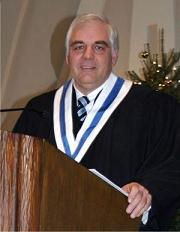
What started out as an idea for Atlantic Canadians has turned into a nationwide education program, spouting more than 800 alumni since its beginning.
For the past 15 years, St. Francis Xavier University in Antigonish, Nova Scotia, has offered an adult distance education program in ministry, and it’s been embraced across the country.
Developed by religious education experts, the Diploma/Certificate in Ministry Program is a Catholic content program offered in a distance education format, designed for adults who may be involved, or who wish to be involved, in paid or unpaid ministry in their parish or diocese, or for anyone who wishes to learn more about their faith for personal reasons.
Program coordinator Mary MacInnis tells CCSTA it was an idea that was originally crafted for East Coast residents.
“It all started in 1993, when the president of university called together leading religious education experts in Atlantic Canada to determine how St. Francis Xavier could meet the adult faith education needs in Atlantic Canada,” she explains.
The university, however, quickly shifted its focus.
“A Catholic newspaper article was published, telling people about the program and someone in London, Ontario wanted to take the program,” she says. “Though it was a program initially for Atlantic Canada, we said, ‘if it’s distance education, why couldn’t we offer it across the country?’.”
So they did.
Since the first program was offered in 1996, MacInnis says its popularity grew across the country.
The program’s students come from varied backgrounds. They include those involved in hospital ministry, prison ministry, teachers and administrators in the Catholic School system, RCIA directors and volunteers, religious education coordinators and catechists, palliative care ministers, diocesan staff, campus ministers, and a large number of people who just want to learn more as part of a personal faith journey.
Some Canadian dioceses include these courses as an important part of their lay formation and deaconate training programs, while other dioceses encourage their parishioners to take the diploma courses independently.
Students can determine if they wish to undertake the certificate or diploma program, and the course list includes Ministry in the Christian Community and Adult Religious Education.
A popular diploma feature includes a practicum project, in which students develop and carry out a four-hour adult education project. The project is meant to bring a resource in the Catholic education system to be used by adults within the student’s parish based on the parish needs.
“A student doesn’t just pick the project out of the air, as they have a discussion with their parish priest and retreat with people to get ideas to form an assessment on the parish needs,” MacInnis explains. “The whole point is to build on the experience of people coming to the project and workshop.”
Working in this department since its inception, MacInnis says she sees the benefits the program provides to each student and their faith and education.
“What makes it all worthwhile is we talk to people and hear it makes a difference for them and gives them self confidence in their knowledge,” she says. “This program gives them more skills and theology, and I see a difference in their confidence.”

Required readings and course notes require time commitment from students, with the suggestion to set aside 10 to 12 hours per week for each course.
“You have to be self disciplined and you have to make time,” says MacInnis. “You’re asked to stop and reflect on your experience with what you’re reading, and it really is a personal journey.”
MacInnis says for those who are not sure if they wish to proceed with the entire program, she suggests they take one course to see how it fits into their life.
“Register and take one course, and then you can apply to the program afterwards,” she explains.
New applications are accepted and courses are offered on the semester basis, fall and winter. The fall term begins the first week of September, the winter term begins the first week of January and the spring term begins mid-April. Courses are not offered in the summer months.
To learn more or apply to the program, please visit the website at www.stfx.ca/academic/continuinged/Ministry.html.
Categories:


Leave a comment